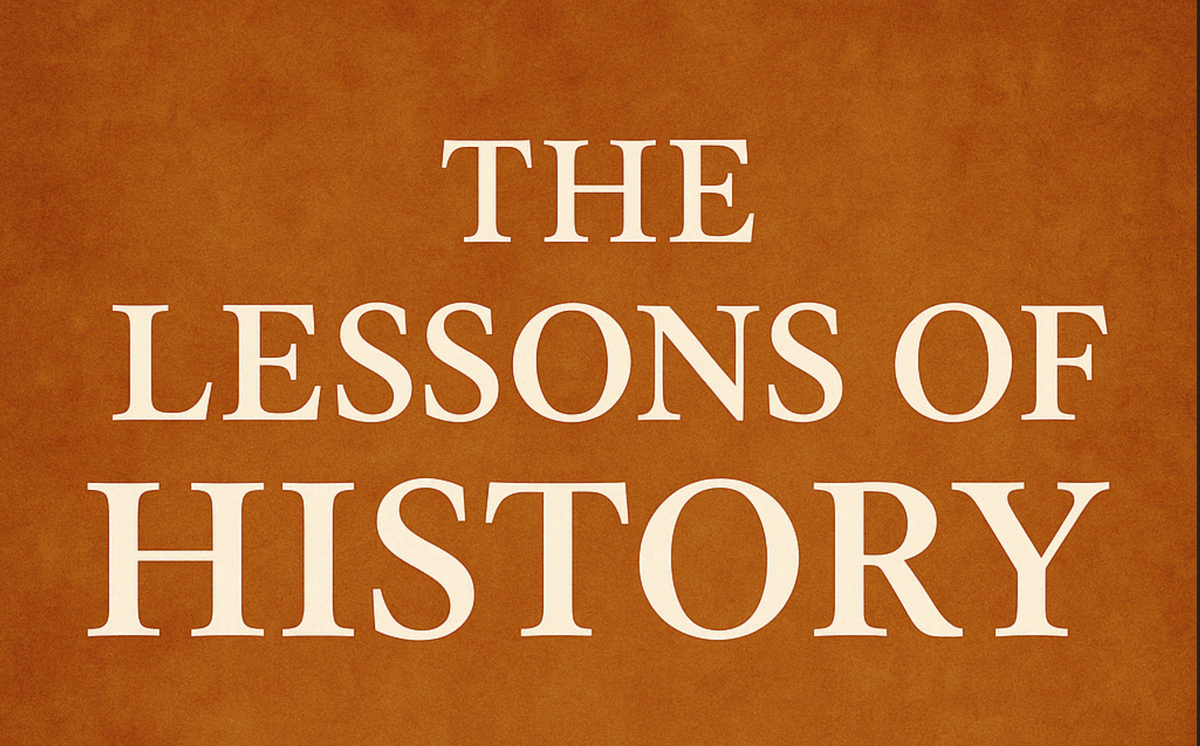The Lessons of History: My Takeaways from a Masterpiece

I recently revisited The Lessons of History by Will and Ariel Durant—a short but towering work that distills thousands of years of human civilization into deeply insightful reflections. What drew me to the book—and why I keep returning to it—is the authors' rare ability to blend elegant, sophisticated prose with sharp, matter-of-fact observations about the patterns of human behavior.
This post outlines some of my personal reflections, alongside the main takeaways I believe every reader should walk away with.
📜 Why I Love This Book
There’s something uniquely timeless about how the Durants approach history—not as a static collection of facts, but as a fluid stream of recurring themes. The prose is accessible without sacrificing intellectual depth. They write like seasoned philosophers, but speak with the clarity of everyday truth-tellers.
Most importantly, they remind us that while technology and tools change, human nature does not. Our instincts—for power, for survival, for meaning—have remained constant across millennia. The conflicts of today are echoes of yesterday.
🔁 History Repeats Itself—But Only in Broad Strokes
“History repeats itself, but only in outline and in the large.”
While events may not recur identically, the patterns do. The cycle of rising and falling civilizations, youthful rebellion and eventual conformity, moral experiments followed by conservative backlash—these loops define the arc of human history.
The Durants argue that human nature changes with “geological leisureliness.” We may evolve socially, but biologically and psychologically, we're wired in much the same way as our ancestors.
🧬 Human Nature Is the Real Driver
“Society is founded not on the ideals but on the nature of man.”
One of the book’s most profound themes is that all history is essentially character and instinct scaled up. The impulses of individuals—both virtuous and destructive—aggregate into the behaviors of civilizations.
In this view, it’s not ideology or morality that shapes empires, but the tension between opposing human instincts: action vs. inertia, generosity vs. selfishness, cooperation vs. competition.
⚔️ War and Conflict Are Inevitable Outcomes
“In the last 3,421 years of recorded history only 268 have seen no war.”
Conflict, according to the Durants, isn’t an aberration—it’s a feature of human organization. War arises from the same forces that drive competition among individuals: pride, acquisitiveness, and fear. Until there’s a higher authority than the nation-state, war will remain our species’ ultimate selection mechanism.
The chilling part? Even the most hopeful efforts at diplomacy often succumb to power imbalances and cycles of mistrust.
🌱 Civilizations Grow, Then Decay
“A civilization declines not from mystic limitations, but from the failure of its leaders to meet the challenges of change.”
Like organisms, societies have life cycles. Civilizations grow through creativity, cooperation, and leadership. They decay when inequality spreads, morals weaken, and adaptation slows. Economic stagnation, political decay, and spiritual apathy are all symptoms—not causes—of civilizational decline.
🔄 Innovation vs. Tradition
One of the most nuanced arguments the Durants make is for the balance between progress and preservation:
“The conservative who resists change is as valuable as the radical who proposes it—perhaps more so, as roots are more vital than grafts.”
New ideas are necessary, but most innovations fail. Tradition contains the hard-won wisdom of generations. Society advances not just by welcoming the new, but by rigorously testing it against the old.
📚 Is Progress Real?
It’s one of the final questions the Durants ask—and they leave the answer intentionally nuanced. Technological progress is indisputable. But moral progress? Cultural wisdom? Human happiness?
“We are the same trousered apes at two thousand miles an hour.”
Progress, in the end, is not automatic. Civilization must be transmitted, not assumed. Without education, reflection, and moral effort, we risk becoming savages again.
✨ Final Thoughts
What I found most striking about The Lessons of History is how much relevance it holds today. It makes the modern world feel less chaotic and more understandable—through the lens of recurring human patterns.
If you’re building something new, navigating change, or simply trying to make sense of the world, this book gives you a powerful mental model. It reminds us that innovation must be paired with humility, that conflict is not new, and that understanding history may be our best hope at shaping a better future.



